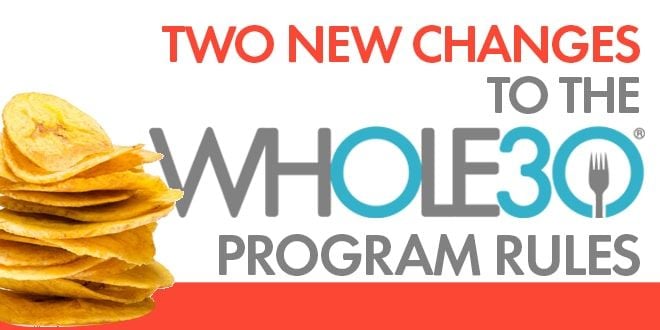From Whole30 CEO and co-founder Melissa Urban, who works really hard to make the program both effective and easy to follow
It’s been a long time since I’ve issued any changes to the Whole30 rules; the last was in 2014, when we brought back the white potato. Making a rule change is a really big deal; it’s a huge communication effort to share the new information with millions of people worldwide and update all of our books and resources. But food manufacturers continue to create grain-free, dairy-free products that didn’t exist when I wrote the original Whole30 rules, and frankly, they’re making my job really hard here.
After much research, discussion with my forum moderators, and consulting the Whole30 team, we concur it’s time to revise a few points, based on the current marketplace. Here are two new Whole30 rules, effective April 1, 2017 (or right now, since you’re reading it). If you want, just read the rules and apply, easy-peasy. If you want to hear the thought process behind the changes, however, I’ll describe in detail below.
New Whole30 Rules
- No store-bought chips of any origin (potato, tortilla, plantain, coconut, kale…)
- Coconut aminos are an exception to the “no added sugar” rule (and continue to be permissible on the program)
No Store-Bought Chips
When we brought white potatoes back in 2014, one sticky issue was, “How do we keep people from eating French fries and potato chips, as those are obviously not in the spirit of the Whole30?” The answer was easy; saying, “No potato chips, and no restaurant or fast-food fries.” Back in 2014, all you could find in the store were potato chips or “Sweets n Beets.” Kale or broccoli “chips” didn’t exist, tortilla chips were made only with corn, and plantain chips were just showing up on the scene, but not popular enough to be on our radar.
Over the last few years, the variety of “healthy” chips in stores have exploded. You can now buy “nacho” flavored kale chips, cassava flour tortilla chips, and “roasted” plantain chips containing technically compatible Whole30 ingredients. This has caused great confusion in the community—kale chips must be okay because they’re kale, but what about plantain chips, or those potato chips fried in unrefined coconut oil? It was hard to keep up with; a fact I saw reflected in the #whole30 photos you’re posting on Instagram. In thinking about how to communicate my thoughts on the place of chips on the Whole30, I kept coming back to the central theme: Face-planting into a packaged bag of chips (of any nature) has no place in resetting your health, habits, and relationship with food.
Especially plantain chips. You know you crack out on them, and news flash: THEY’RE NOT ACTUALLY HEALTHY.
So, allow us to make it easy for you, and return to our Whole30 “real, whole, nutrient-dense” food roots: No store-bought chips. Period. Not even if they’re kale. Not even if they’re roasted. Not even if they’re cooked in coconut oil. Chips of any nature are counter to the Whole30 mission, they’re pushing more nutrient-dense food off your plate, and they’re all too easy to turn into food with no brakes.
It’s only 30 days, and you can do better.
Feel free to make your own real-food version at home; bake kale leaves, pan-fry plantain slices, or roast potato wedges. But please, no deep-frying. That should go without saying.
Coconut Aminos
Coconut aminos (a soy sauce substitute made from coconut) came on the Whole30 scene around 2013. The first company to release the product was Coconut Secret, and the ingredients read, “Organic coconut ‘sap’ aged and blended with sun-dried, mineral-rich sea salt.” Based on this ingredient list*, it appeared totally Whole30 compatible. We began using aminos in our recipes and cookbooks, creating Asian-inspired dishes with exciting flavors.
Today, we have a variety of aminos; Big Tree Farms is a major market player, and Thrive Market has their own brand of aminos. Trouble is, their ingredients read slightly different: “Organic fair trade coconut blossom nectar, sea salt.” And it’s that one word, “nectar,” that’s causing trouble, because in Whole30 lingo, “nectar” = “sugar.”
I got on the phone with Elizabeth from Big Tree Farms, so she could explain the way aminos are made. The nectar itself is harvested from the coconut flower blossoms (not the tree itself, as the word “sap” might indicate). From there, you can do a few things with the nectar: brew it down with sea salt and water (natural fermentation may be part of this process) and turn it into aminos; dry it and allow it to granulate, turning it into coconut sugar; or sell it as coconut syrup, a liquid sweetener substitute.
So technically, all aminos are derived from a sugar source—but not all labels are clear about that. Which means that according to the current rules, some brands of aminos are out, while some are allowed, based solely on the way the companies chose to write the ingredients on the label.
Furthermore, unlike the other two forms of coconut nectar, aminos are not a sugar substitute. Would you add it to your coffee or tea, or pour it over berries? (EW.)
To avoid further confusion, we’re just going to write a new exclusion into the rules: “coconut aminos” are compatible for the program, even if the words “coconut nectar” or “coconut syrup” are on the label.
*When you read the rest of the Coconut Secret label, the word “sap” is in quotation marks, and the bottle description does say it comes from “sap that exudes from the coconut blossom.” Consumers (myself included) assumed the product came from the tree (or the coconut itself), but it is sourced from the coconut blossom, just like the other brands.
Next Steps
First, these new rules officially go into effect on April 1, 2017. If you’ve been eating ingredient-compatible plantain chips or store-bought kale chips, you don’t have to start over; just stop eating them. (And if you’ve been using aminos of any brand, nothing actually changes.)
Second, we’d appreciate you helping us share the rules by reposting our Instagram post, sharing our Facebook post, or Tweeting about it (below).
Third, we’ve already updated the Can I Have blog post, the Whole30 Program Rules, and the accompanying PDF. We’re also in the process of cleaning up old forum entries with out-of-date info. However, patience, please, as that process could take a while. I’m also working the revisions into immediate reprints of The Whole30 and The Whole30 Cookbook.
Finally, we’ll be working with our partners at Thrive Market and Barefoot Provisions to remove kale chips from their Whole30 kits. This could take a little while, logistically.
On behalf of the Whole30 team, thank you for your continued support and your tolerance for these occasional changes. We are always evaluating the rules for their logic, foundation in science, effectiveness, and ease of use. Balancing all of those isn’t always easy, but we think these changes encompass the spirit and intention of the program, while making it even easier for you to follow the rules.
Even if you’re mad about the plantain chips.
















